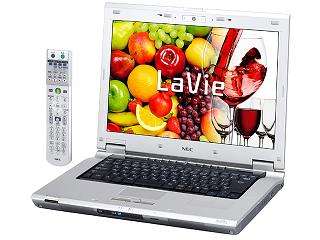September 4, 2007 weblog
'Face pass' is latest security system for NEC laptops

NEC has launched two new series of laptops with a unique security feature called "face pass" -- or, in Japanese, "kao pass."
The LaVie C and LaVie L series will both include the new facial recognition software, which enables only a programmed user to log on to the computer.
NEC’s software, called "NeoFace," is a biometric system that uses a combination of eye zone extraction and facial recognition to identify the computer’s user. To program the system, a user sets up a profile with three photographs of their face. Then when a user tries to log on, an integrated 2.0 megapixel camera scans their facial characteristics.
The NeoFace system then uses a matching procedure to determine the identity of the user. NEC says that the system performs accurate matching even when people wear glasses and hats, have different haircuts or facial hair, and show different facial expressions. The ability to distinguish between identical twins is still speculative.
“NeoFace uses a technology called ‘adaptive region mixed matching,’ which focuses on ‘segment regions’ with a high degree of similarity for matching,” explained Atsushi Sato, a head researcher at NEC. “Other makers’ products make judgments based on a number of combined characteristics, such as the distance between the eyes and the nose, or the nose and the mouth. But this creates a problem, because if even one of these segments is missing, the accuracy drops dramatically.
“In contrast, NeoFace divides the input image and the registered image into small segments, and focused only on the segments that are highly similar,” he continued. “This enables the system to achieve higher authentication accuracy than out competitors’ products, even if a part of the subject’s face is hidden, for example by a mask or sunglasses.”
NEC originally developed NeoFace for security applications, such as border control, prison management and corporate security, to eliminate the need for fingerprints. In July 2007, NEC announced the first automated border control system to use facial recognition technology that can identify people inside their cars. At checkpoints on the Hong Kong-Shenzhen border, the system reads a car’s license plate, and compares the driver’s face with the registered driver’s micro-chipped ID.
“The main advantage to face authentication is convenience,” said Kazuyori Miyaoka of NEC’s Business Promotion Department. “A number of other authentication methods are currently in the research stage, for example using the shape of the ears or the patterns of blood vessels on the back of the hand, as well as a person’s walk, smell, DNA or keystroke habits when using a PC keyboard.”
As for the consumer laptops, both the LaVie C and LaVie L series are expected to be available in the Japanese market in late September. Besides the face pass system, the laptops will have mostly standard features: 15.4-inch displays, Core 2 Duo processors on the top-end LaVie C model or the option of either Core 2 Duo or Celeron processors on the LaVie L model. Blu-ray is also available for the high-end model. The price is expected to range from ¥150,000 to ¥310,000 (or about $1,300 to $2,675).
Some of the above information was adapted from NEC.





















